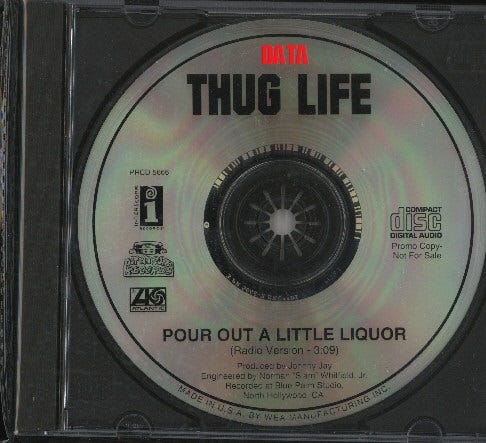Hugs, Shrugs, and Data Thugs
A critic has no name.

‘Data thug’ — to the best of my recollection — was the product of my dedicated and unending personal silliness. This is a quality I go out of my way to cultivate.
Originally, it was a tongue-in-cheek riff on the idea of the “self-appointed data police”, one of the many unflattering descriptions of public scientific critics which heaved out of Susan Fiske’s piece in the APS Observer, and slouched towards Bethlehem etc.
(You know the piece — it’s the one that ‘methodological terrorist’ was eventually redacted from.)
I found this one particular term funny, though. “Self-appointed data police”.
The juxtaposition of self-appointed police is part of it. Police are empowered by the state, you can be a self-appointed cop no more than you can declare yourself the new cornerback of the St. Louis Rams, and then show up to practice with your bad knee and Dr. Scholl’s sandals.
But the concept is not done being funny there. The idea of critics having any kind of vested authority — or, in some cases, any ability at all to enact changes to the published scientific literature, or even the response to polite emails — is also ridiculous.
That is, if you can’t declare yourself a cop, you double can’t declare yourself having the authority to act as one. That would be hells of dangerous. Basically, a guy wearing three socks and one shoe declaring he’s Napoleon in the street is funny, but it’s substantially less funny if he raises an army to raze Prussia.
Thus, goes the riff: Policeman I am not, I’m just putting the boots to anything bad that comes in front of me. That isn’t police work, it’s some kind of academic street crime, an act of opportunity. And if you find yourself in perpetual opposition to the established order, are you supposed to be a rogue cop?? Hyyyyells no. I’m not a policeman, I’m a THUG.
(Yes, this is deliberately self-parodic. Please remember that I wrote a whole article on how we actually conduct the business of serious criticism — which is seriously, slowly, and generally politely, with manifest steps taken to prevent the merest whiff of crankery.)
And this is how criticism is seen. Some kind of violation of expected boundaries. An act that vaunts people into pearl-clutching and stuttering rarely seen outside of George VI’s early speeches.
So, I hoofed this silly term into public discourse, stuck it in my various online bios, and forgot about it completely because no-one mentioned it for a year or so. Until it ended up in the header of a Science mag article about me and Ole Nick, next to a cartoon of us dressed as mafiosi, which very suddenly pushed it into some kind of collective lexicon.
That’s what I get for opening my big mouth.
Now, having met people IRL who’ve said things like Oh You’re That Data Thug Guy, the stupid bloody thing might have outlived its usefulness. As much as it’s still occasionally amusing.
Look, I’d happily throw the term in the bin tomorrow, forever.
It’s not that I don’t like it, or don’t hate it, I just don’t care that much and I’m a pragmatist (you might have noticed). ‘Data thug’ is neither particularly accurate nor necessary, and I’ve seen plenty of people have a variety of other problems with it, such as the fact that out of context it sounds needlessly hostile.
It’s also got no immediate descriptive utility — what does a data thug do, punch a 7? And where does this leave *methodological* criticism? Data is not the only game in town, public scientific criticism feels like it’s much more centered around demonstrable accuracy in all forms.
And here we get to the center of the problem.
There is no encased term for a scientific critic.
The role of “person who investigates published science for demonstrable inaccuracy” has no name.
There are no specialty journals which publish investigations or criticisms of research published elsewhere. Issues like this are supposed to be dealt with by the journal of publication. Often, they do it badly.
If criticism which is offered publicly results in a paper being corrected or retracted, there is no official record that this took place. Occasionally, a journal writes an explanatory note, which will say something punishingly vague, like This paper was retracted because of problems pointed out by people.
Academics, participants in a metric-obsessed culture who will measure a half-eaten ham sandwich and put its dimensions on their CVs if they think it will confer them some seniority, have no measurement and hence no name or structure for robustness checks.
This is the reason that GRIM and SPRITE never existed before we came along, with our hugely average mathematical abilities and wavering confidence. Both of these techniques are, and I’m being generous here, really goddamn simple. In a sane world, they are regulation ideas that would have existed at the hands of more skilled people a long time ago.
That’s probably the reason anyone took what now feels like a stale joke the least bit seriously in the first place, the fact that it replaces nothing, and its absence would return us to nothing.
You are allowed to be critical in science, but it was somehow never imagined that you would be a critic — someone with a sustained research interest in the act of criticism foremost, and out of domain-specific context.
(I refer of course to the act of putting numbers in order, not the act of being broadly critical of domains, theories, or scientific enterprise more broadly. Obviously there’s a lot of evidence-based fighting over who has the Best Idea.)
Hence, the vacuum. Because all the other terms suck at a variety of psi.
Meta-scientist is too broad, and encompasses a variety of other domains. So is critic itself, of course. We’re all critics of something at some volume.
Destructo-critic is just silly, because we’re not Transformers, so is replication police or any other narc-based terminology (see above). Shameless little bullies is replication-specific (and just plain mean), vigilantes does nothing to differentiate itself, etc. etc.
Actually, in many ways, methodological terrorist is the most accurate term. From my previous:
It captures [a] the urgency with which critiques are offered, [b] the power asymmetry between the critics and the subject of their criticism, [c] the resort to unconventional methods of resistance because formal means are unavailable, [d] the acceptance that affecting the public mood negatively might be necessary for progress, [e] the implicit acknowledgement that asymmetric conflict is actually super-effective if you lack formal power, and [f] the well recognised and irreconcilable tension between ‘terrorists’ and ‘freedom fighters’.
What it also does is use the word methodological, which well encompasses methods, statistics, and data. Good word. The only problem, of course, is the other word. It’s not exactly de rigueur to go around declaring that you are a terrorist, and not just because you’ll end up on a list. It’s because the term will be taken at face value by people encountering it for the first time, which is most researchers, and they will be encountering it entirely without context.
And then you have the same problem as data thug.
So.
What SHOULD it be called?

